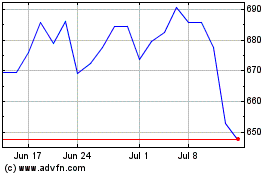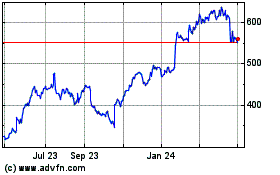By Maureen Farrell, Aaron Kuriloff and Don Clark
A sharp dive in technology shares underscored investor worries
about uneven U.S. economic growth, as the latest lackluster
corporate outlook, this time from LinkedIn Corp., fueled a rush out
of stocks.
In the most jarring example of investor unease, LinkedIn's
shares tumbled 44% on Friday following a disappointing earnings
forecast. A weak reading on jobs growth added to the woes, helping
to push down the Dow Jones Industrial Average 211.61 points, or
1.3%, to 16204.97.
The tech-oriented Nasdaq Composite Index dropped 3.2% on its way
to a 5.4% drop for the week. The tech sector has been an investor
favorite in recent years, reflecting the strong growth and
popularity of big firms such as Facebook Inc., Amazon.com Inc.,
Netflix Inc. and Google parent Alphabet Inc.
But those firms all slumped at least 3% Friday, after LinkedIn
and another smaller technology firm, data-analysis software maker
Tableau Software Inc., posted softer-than-expected growth
projections for 2016.
Tableau's shares plummeted 49%, and other tech companies dropped
as well, including a 5.8% decline in Twitter Inc.
Analysts said the scale of the selling highlights the
vulnerability of the technology sector at a time when the U.S.
economy is expanding in fits and starts, corporate earnings are
under pressure, and investors are concerned that global economic
problems will spill over to the U.S.
While the prospects of firms such as Facebook and Google aren't
directly affected by poor results at smaller tech firms in
different fields, all the companies have been trading at high
valuations, a factor that makes them vulnerable to selling for
essentially any reason. And if any of tech's highflying companies
falter, analysts said, other stocks likely will be even more
vulnerable.
"It's the realization that the world is slowing," said Michael
Antonelli, an equity sales trader at brokerage Robert W. Baird
& Co.
He said poor earnings at LinkedIn and Tableau, together with
high earnings multiples and fears of slowing U.S. growth, are
causing investors to retreat from risk, for fear that earnings
growth will decline in coming months.
LinkedIn, an online professional network, late Thursday
projected revenue this year would increase roughly 22%, down from
35% in 2015, and far below analysts' expectations.
Chief Executive Officer Jeff Weiner said Thursday that LinkedIn
continues to make inroads with large corporate clients. The company
added more than 3,000 new corporate accounts in the fourth quarter.
Analysts said LinkedIn earned nearly $4,000 a month from each
corporate customer in the fourth quarter, roughly flat with the
year before.
"There has been increasing demand, in terms of large-scale
multinational enterprises. And again, it's going to take time to
continue to roll out the product, and ensure that companies are
ready to fully embrace social selling. It's a new practice, and
we're looking forward to continuing to educate the marketplace on
that front," he said.
The concerns were accentuated by comments late Thursday from
data-analysis software maker Tableau Software. Tableau said it
expects revenue this year of $830 million to $850 million, down
from its previous projection of $845 million to $865 million.
"We saw some softness in spending, especially in North America,"
Tableau CEO Thomas Walker told analysts. "We did see our customers
continue to expand their use of Tableau in the organizations, but
not at the same cadence we'd historically experienced."
Tableau's comments helped spark an exodus by investors from
other business-software makers.
Salesforce Inc., a maker of customer-relationship software with
annual revenue exceeding $6 billion, fell 13%. Smaller firms were
hit harder: Splunk Inc. fell 23%; New Relic Inc., 22%, Hortonworks
Inc., 17%; Workday Inc., 16%; and NetSuite Inc., 14%.
Atlassian Corp., which makes software used to run corporate
technology services, made more upbeat comments along with its first
quarterly results as a public company on Thursday. Quarterly
revenue rose 45% from a year earlier and the company said it added
2,600 customers. But its stock also was pummeled Friday, falling
16%.
Analysts questioned whether Tableau's comments should be
considered a sign of trouble ahead for others in the sector.
"We are not seeing across-the-board macro-related weakness in
the software sector," said Karl Keirstead, a Deutsche Bank analyst,
in a research note. He said greater competition in the company's
markets and internal issues with its sales force may be to
blame.
Others said they believe the largest tech firms remain solid
investments, given their dominance of their respective markets.
While stock markets have been declining and volatile this year,
they will rebound at some point, and these firms' prospects likely
will make them winning investments over time.
"In the short run, there's a valuation question, but it seems to
me that strategically, the growth path for these companies isn't
over," said David Kotok, chief investment officer at Sarasota,
Fla., money manager Cumberland Advisors.
Even after Friday's selling, Amazon traded at a 402 times its
earnings over the past 12 months. Netflix traded at 296 times,
Facebook traded at 81 times and Alphabet at 31 times. The S&P
500 average is 21.4, according to Birinyi Associates.
But others said the selling pointed to a confluence of concerns
about the U.S. economic outlook, with its negative implications for
corporate earnings, and high valuations that analysts said have
essentially meant investors were assuming that firms would keep
expanding faster than they are now expected to do.
According to Bespoke Investment Group, the 50 stocks with the
highest price/earnings ratios in the S&P 500 averaged a decline
of 3.1% as of midday Friday.
"Investors appear to be much less willing to pay up for growth
today than they were yesterday," Bespoke said in a research note.
"This looks like a case of "valuations don't matter...until they
do."
Deepa Seetharaman contributed to this article.
Write to Maureen Farrell at maureen.farrell@wsj.com, Aaron
Kuriloff at aaron.kuriloff@wsj.com and Don Clark at
don.clark@wsj.com
(END) Dow Jones Newswires
February 05, 2016 19:52 ET (00:52 GMT)
Copyright (c) 2016 Dow Jones & Company, Inc.
Netflix (NASDAQ:NFLX)
Historical Stock Chart
From Mar 2024 to Apr 2024

Netflix (NASDAQ:NFLX)
Historical Stock Chart
From Apr 2023 to Apr 2024
